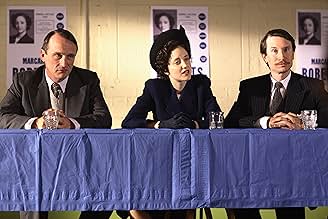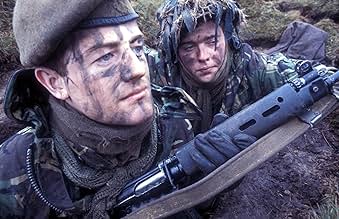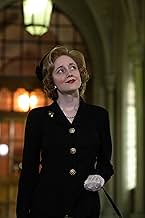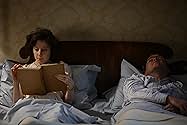अपनी भाषा में प्लॉट जोड़ेंOn April 2, 1982, Britain went to war to regain the Falkland Islands. This movie is a gripping account of how Prime Minister Rt Hon Margaret Thatcher MP's government handled the biggest cris... सभी पढ़ेंOn April 2, 1982, Britain went to war to regain the Falkland Islands. This movie is a gripping account of how Prime Minister Rt Hon Margaret Thatcher MP's government handled the biggest crisis in British foreign affairs since the Suez Canal. It tells the story of how Argentina, a... सभी पढ़ेंOn April 2, 1982, Britain went to war to regain the Falkland Islands. This movie is a gripping account of how Prime Minister Rt Hon Margaret Thatcher MP's government handled the biggest crisis in British foreign affairs since the Suez Canal. It tells the story of how Argentina, an ally of the British, fought the Conservative government and invaded the Falklands. This ... सभी पढ़ें
फ़ीचर्ड समीक्षाएं
Originally written by Ian Curteis shortly after the war ended but the BBC declined to produce it, officially because it wasn't good enough, but widely believed to be because it was too pro-Conservative just before a General Election in the UK. Watching it now it's even harder to believe that it wasn't good enough to make years ago.
Telling the story of the British politics immediately before and during the conflict Patricia Hodge is brilliant in her role as Mrs. Thatcher. So scarily like her that during the recreated news clips it's hard to remember which one is the actress. Although some of the other lead characters look and sound nothing like their alter-egos, they still manage to recreate the right atmosphere.
Deliberately supposed to show the conflict from `our side' I'm not sure if the emotional side of Margaret Thatcher isn't over played slightly.
Patricia Hodge was wonderful as "Maggie" and being a big fan of British TV and films many other faces were quite familiar. I was quite struck by how Rt Hon Francis Pym and members of the labor party has so quickly forgotten the lessons and cost of appeasement! At one point I would've loved to hear Mrs. Thatcher respond to those questioning the rightness of fighting over "some small rocks and a handful of people" with "If 1,800 British subjects are not worth fighting for, please tell me, exactly, what is the minimum number that IS? 5,000? 10,000? 100,000? 1,000,000?"
Besides having been there to listen to the daily coverage, I've watch a number of documentaries and read a number of books on the battle including the memoirs of the Battle Group Commander Adm. Sandy Woodward. Everything in this movie tracks closely with everything else that I know about the time, the situation and the battles. The one thing I would take exception with, frankly comes as no surprise to me. The all too familiar anti-American jealousy/prejudice that is very common in British programming. One need only contrast the carefully chosen flattering selection of Patricia Hodge to play Margaret Thatcher with the perhaps equally carefully chosen unflattering selection of Bob Sherman to play President Reagan. Not only did he bear no resemblance beyond an American accent, he played Reagan as a bumbling fool who couldn't even remember the name of the islands rather than the strong leader who helped bring down the Berlin wall and with it the Soviet Union. The most pathetic moment was portraying Reagan as having trouble deciding which tie to wear while discussing the issues. That was simply petty and mean.
Lost in all of this is the reality that the British government had allowed this crisis to develop through apathy, neglect and an unwillingness to sacrifice. The Argentine government was emboldened to act due to the steady decline of the power of the Royal Navy and in fact, had they the patience to simply wait a year or two more, the RN's only two carriers would've been decommissioned and Britain would've been forced to accept the take over of the islands. As it is, the losses of British shipping, especially that of the Sheffield and Coventry were reportedly contributed to a decision to cut costs on construction by reducing the length of the ships eliminating the space required for the anti-missile system they were originally designed to carry. This would seem to be a major deficiency for a ship supposedly designed for radar picket duty to detect and defend incoming missile attack! Oddly enough, another documentary I recently watched about the Eurofighter project disclosed similarly dangerous cost cutting which only proves that even those lessons written in blood are too soon forgotten!
Within minutes I knew this is great TV. Who cares if shows the Rt Hon Margaret Thatcher as a great PM or not. The acting is what I was watching Patricia Hodge is just so good at Playing Maggie & as for Shaughan Seymour as Adm Sir Henry Leach is he a good actor or is Carrie Hilton, Casting Director one of the greats or maybe Michael Samuels the Director who knows how to get the best out of the actors or just maybe all three.
I am waiting for this to come out on DVD. I will buy it, great viewing great acting.
Ohh how lucky was I again, this was on on Friday 8 th March 2006 & this time I had the VRC ready. It was just as good as the 1 st time I watched it, no that is wrong, it was better, I have seen it twice since Friday, there are bits I never noticed the 1 st time & not even the 2 nd time. I can only say again what great TV & so well acted.
Thank you BBC 4 for showing this.
Update March 2007 now on DVD & yes i have bought a copy.
I have since bought "An Ungentlemanly Act" on DVD, great well worth the £4.99p from Play.com.
The film certainly has a fine cast. Patricia Hodge excels as Thatcher or at the very least playing the Thatcher portrayed in the script. Hodge's Thatcher is a strong willed woman who refuses to back down under any circumstances. The supporting cast includes strong performances from James Fox as Foreign Secretary Lord Peter Carrington, Clive Merrison as Defence Minister John Nott, Colin Stinton as US Secretary of State Alexander Haig, John Woodvine as Admiral Sir Terence Lewin and Tom Chadbon as Admiral Sir John Fieldhouse. Each of their performances, and those of much of the rest of the cast, gives the film a strength that it needs.
The production values of The Falklands Play are strong as well. Melanie Allen's production design captures the real life settings of the film including an excellently done set of the House of Commons. The film's cinematography is exceptional as well with its cinema verite approach. The result is that the film is given a strong documentary feel to the entire film, giving the viewer the sense of watching history unfolding before them. The film also makes strong use of documentary footage from the time as well, mixing it skillfully into the drama. Like the performances, these elements give the film a strength that it needs.
The script by Ian Curteis is at the heart of the film. The script after all was the single most controversial aspect of the production for almost twenty years. Back in the 1980s, the BBC deemed the script to be too pro-Thatcher and jingoistic in its tone. Looking at the film itself, it is very easy to see how that came about. The strong willed portrayal of Thatcher and her handling of her the situation is certainly pro-Thatcher. Also the film's portrayal of the decisions leading to the sinking of the Argentinian warship the General Belgrano, one of the most controversial events of the war, can certainly be seen to be pro-Thatcher. Surprisingly, the script used in the film isn't even the one originally written in the 1980s as it removes all the scenes involving the Argentinian Junta and the Pope. One suspects that the reaction the film would have gotten in the 1980s when it was supposed to have aired would have been similar to the reception that the 2003 Showtime film DC 9/11: Time Of Crisis (a film about President George W. Bush's handling of the 9/11 attacks and the lead up to the invasion of Afghanistan) received when it aired: being seen overwhelmingly as a piece of propaganda. The Falklands Play definitely isn't that but it is all too easy to see how it could have been seen as such.
The Falklands Play is an interesting film. It has strong performances from its entire cast and also features strong productions values especially with its cinematography. The script however is the film's most interesting point as it was the source of controversy that kept the film from originally being made to begin with. With hindsight, it is easy to see why the script proved so controversial at the time and why it could remain so today. The Falklands Play therefore is an interesting film about a controversial war and a intriguing piece of historical drama.
The acting is of the highest order...... you truly believe that these are the people, and this is how they behaved (Hodges Thatcher is remarkable). Add this to a plot that fiction could never match, and you are likely to be hooked from the opening scene.
With caution, I would also suggest that this drama does bring history to the viewer, in a way the BBC seems to constantly excel at. Much of the script is taken from hansard (parliamentary transcripts), contemporary diaries, and news reports..... the drama didn't need to be invented.
One or two earlier reviewers felt that it was a historical distortion, however, in my opinion, they are still grinding axes.
So yes.... do bear in mind that in the years running up to the crisis, perhaps the Brits took their eye off the Falklands (though this is outside the remit of this play).
Also yes.... there was the major incident 'sinking of the Belgrano', that in real life, was controversial. However, I believe the play portrayed the genuine view of the decision makers: 'destroy it, before it destroys us'.... a view held by the majority of the UK population (I would suggest).
As for the suggestion that 'Thatcher would never have ranted against Argentina to the US', I find beyond belief. That's exactly how she behaved, and she was famous for it AND by the way, it is portrayed marvelously in this play, with the joy of historical posturing so well done.
If you get the chance...... watch it!
क्या आपको पता है
- ट्रिवियाOriginally commissioned by the BBC in 1987, but wasn't filmed until 2002.
- गूफ़Admiral Lewin is wearing the South Atlantic Medal. Before the war had even begun.
- भाव
[in a War Cabinet meeting]
Margaret Thatcher: Do we send those ships? Do we still have the will to fight aggression by force of arms, even halfway across the world, even at huge risk of world opinion turning against us? Because if we don't have it any more, for God's sake say so now and pull out before we start. It may be we *are* going to war. People *will* get killed. Innocent people. Young soldiers, many of whom won't even know what it is we are fighting for. Are we really prepared to do that? Do we still believe what we certainly believed in in 1940? Or is that now just the romance of history, nothing to do with the cold reality of Britain in 1982, part of a nation that has, actually, quietly died, as Greece died, as Spain died? Because if in our hearts we really believe that Britain is dead, then it would be a crime of the direst and blackest sort to send those men to fight, a crime of which the country would very soon find us guilty, because their hearts won't be in it. The first death will light the fuse that will blow us sky-high and clean out of office at the next election. Now, do we send the signal or not?
[each cabinet minister, with some hesitation, says "yes"]
- क्रेज़ी क्रेडिटThe first names of Nicholas Ridley and Jeanne Kirkpatrick were mis-spelled as Nicolas and Jeane in the closing credits.
- कनेक्शनFeatured in When TV Goes to War (2011)

































